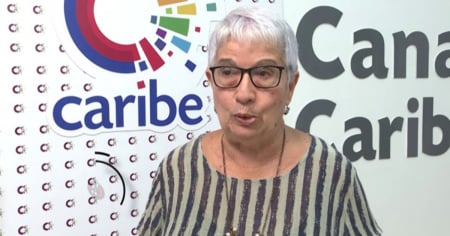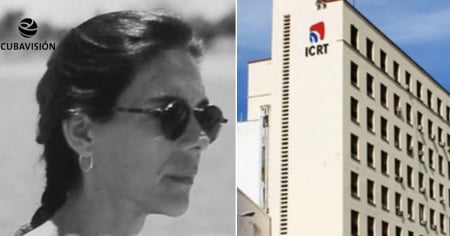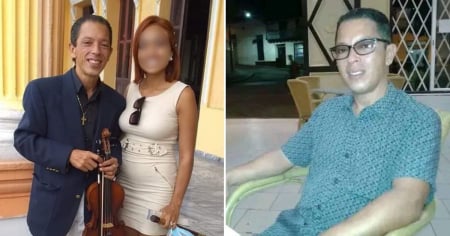
Related videos:
The animal rights community in Cuba is in mourning following the passing of Nora García Pérez, a tireless advocate for animal rights and president of Aniplant for over 25 years.
His passing represents a significant loss for those who share his commitment to the protection of animals, especially dogs and cats, a cause that defined his life and legacy.
Aniplant, the organization he was a part of for 30 years, confirmed his passing in a post on Facebook, highlighting his impact on education, activism, and the promotion of respect for animals.
It is with deep sorrow that we announce the passing of Nora García Pérez. She was an advocate for the protection of all animals, especially dogs and cats.
"Her connection with the media made her an inspiring figure for love and respect for animals," stated the organization.
Born on April 12, 1946, Nora García devoted her life to animal advocacy and education, collaborating with Radio Rebelde, Radio Progreso, and the Educational Channel, where she participated in the program "Tarde en Casa," promoting respect and care for animals.
He also worked closely with children and young people, instilling in them values of empathy and responsibility towards wildlife.
In a posthumous tribute, Aniplant has organized an event at its headquarters in Centro Habana, where friends, associates, and animal lovers can pay their respects before their ashes.
Her legacy will endure in every rescued animal, in every young person raised awareness, and in every voice that continues the fight for a more compassionate and just Cuba for animals.
Despite economic hardships and a lack of state support, animal protectors in Cuba have shown an unwavering commitment to the defense and welfare of stray and vulnerable animals. Thanks to their dedication, many animals have found shelter, food, and medical care that would otherwise be inaccessible to them.
One of the most representative cases is that of activist Rita María Aguiar Dubrocq, who dedicated her life to the protection of animals in Cuba. Her passing in 2023 left a void in the animal rights community, but also a legacy of struggle that others have continued.
Aguiar Dubrocq spearheaded numerous rescue and awareness campaigns, becoming a fundamental pillar of animal rights activism on the island.
Similarly, individual initiatives have emerged to mitigate the impact of abandonment and animal abuse. Marta Utria, a retiree from Baracoa, has turned her home into a shelter for over twenty stray cats, providing them with food and care amid the economic crisis.
Her case reflects the generosity and commitment of animal protectors, who often dedicate their own resources to the cause.
Activism for animal rights has gained momentum in Cuba, with the proliferation of groups and organizations fighting for the protection and rescue of stray animals.
In 2016, the organization Protection of City Animals (PAC) and the group Cubans in Defense of Animals (CeDA) began promoting campaigns for sterilization, adoption, and awareness. These groups have played a crucial role in raising awareness about animal welfare and in promoting appropriate legislation.
Despite the efforts, the economic crisis has worsened the situation of stray animals, particularly in places like Santiago de Cuba. Organizations such as SALBA (Santiagueros por el Bienestar Animal) have raised concerns about the increasing abandonment of dogs and cats due to many families' inability to afford their food.
However, these activists do not give up and continue to mobilize to provide assistance to the animals in greatest need. SALBA has reported the worsening situation and the lack of resources.
Amid this reality, rescue stories continue to be a testament of hope. From the recovery of dogs on the brink of death to the fight for the enactment of animal protection laws, Cuban activists have shown that, thanks to their efforts, animals in Cuba still have a chance to survive.
Frequently Asked Questions About the Work of Nora García Pérez and Animal Rights Activism in Cuba
Who was Nora García Pérez and what was her contribution to animal rights activism in Cuba?
Nora García Pérez was a prominent advocate for animal rights and president of Aniplant for over 25 years. Her work focused on the protection of dogs and cats, as well as on education and raising awareness about respect for animals in Cuba. She collaborated with various media outlets to promote these values and worked closely with children and young people to instill empathy and responsibility towards wildlife.
What is the legacy of Nora García Pérez in the context of Cuban animal activism?
The legacy of Nora García Pérez endures in the education and awareness regarding the respect and care of animals in Cuba. Her commitment to animal protection inspired many, and her influence remains alive in every rescued animal and in every young person made aware. Aniplant, the organization she led, continues its work defending the rights of animals on the island.
How has the economic crisis in Cuba impacted animal activism and animal protection?
The economic crisis in Cuba has significantly affected animal activism, complicating responsible ownership and animal care. The scarcity of food and veterinary resources has led to an increase in pet abandonment, and shelters often find themselves overwhelmed by the number of animals in need of attention. Animal protection organizations rely on collaborations and donations to continue their work.
What legal measures exist in Cuba to combat animal abuse and how are they applied?
In Cuba, the Animal Welfare Law was approved in 2021, but its implementation has been insufficient. Sanctions, such as fines, have been deemed inadequate by activists, who demand harsher and more effective penalties for those who commit acts of cruelty against animals. The animal rights community continues to pressure for stronger laws and to ensure that penalties are appropriate to the severity of these acts.
Filed under:






